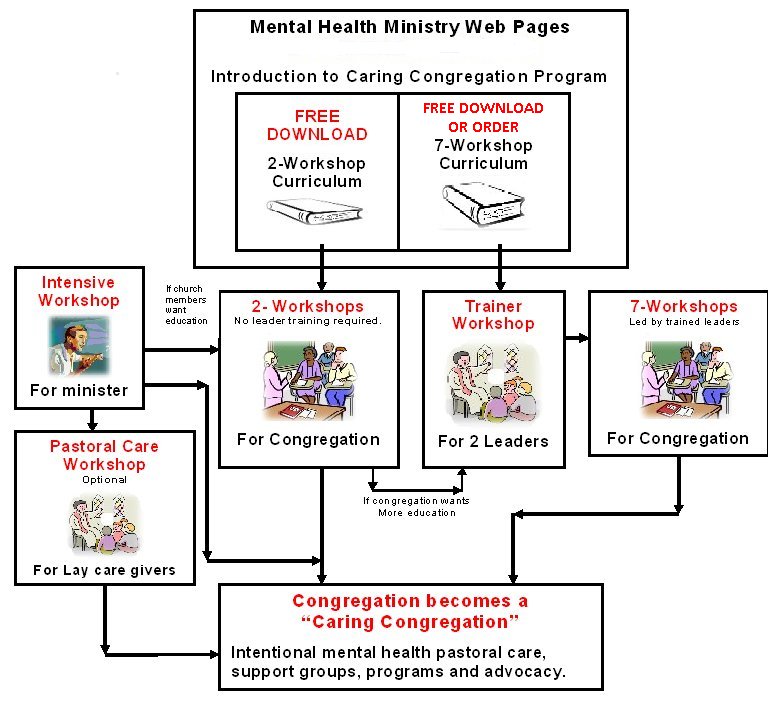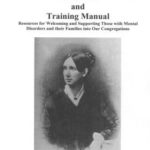Caring Congregation Program
|
You can judge a civilization by the way it treats its mentally ill.
Where to obtain the Curriculum: |
| The 2-Workshop Version of the Curriculum |
The 7-Workshop Version of the Curriculum |
||||
| This version of the curriculum does not require any special training program for the people who will teach it. Click here for a free electronic copy of the Two Workshop Curriculum for Caring Congregations Note: You will need a copy of the Adobe Reader to read the on-line curriculum documents. If you don’t have it, you can get it for free by clicking the button below. |
This is the complete 7-workshop version of the curriculum including the training lessons for leaders.
For a printed copy of the complete curriculum (270 pages), the cost is $23.00 including shipping and postage.
|
The following diagram shows the documents and workshops for training to become a Caring Congregation.

The Caring Congregation Program Documentation and Education
Program Description
This is a curriculum and resource manual for The Caring Congregation Program, a voluntary program that helps congregations become more intentionally inclusive and supportive towards people with mental disorders and their families. The goal of the workshops is to reduce prejudice by increasing understanding and acceptance among people who have mental disorders, giving ideas for specific supportive actions that can be undertaken. It intentionally honors the spiritual component in caring for mental disorder, thus building a community that will become a source of caring for those with mental disorders.
Goals for Participants
- To provide a safe place for people with mental disorders and their families to spiritually grow
- To learn more about themselves and their attitudes regarding mental disorders
- To learn more about their congregation in terms of inclusion and support
- To actively make their congregation more welcoming and supportive to people with mental disorders and their families.
- For future leaders to learn to teach the curriculum to others.
Age Range: Youth to Adult
Size of Group: The program is intended to involve as many people in the congregation as possible, including those in leadership roles.
Number of Sessions: Seven workshops about 2 hours each for adults and youth; flexible design
Please give any comments or feedback to Rev. Barbara Meyers at com_minister @ mpuuc.org.
Workshop For Adults and Youth
- Mental Disorders and their Consequences: What is a mental disorder? Who are those with mental disorders? Prejudice against people having a mental disorder.
- Specific Mental Disorders and How they are Diagnosed: Mood Disorders, Anxiety Disorders, Psychotic Disorders, Personality Disorders, Substance Abuse and Mental Disorders
- History of Mental Disorders: The history of mental disorders and their treatment, including contributions by Unitarians and Universalists.
- Mental Disorders in Special Populations: Childhood, Youth, The Elderly, Race and ethnicity in mental health care
- Mental Health Treatment Options: Psychiatrists, Therapists, Support Programs, Alternative Care options, the Consumer Movement
- Families and Friends of those with Mental Disorders: Helpful suggestions and resources for families and friends with a loved one who is living with a mental disorder.
- The Role of the Church: Religion / Spirituality and Mental Disorders. Advocacy for those with mental disorders; Building a congregational plan and covenant to be a Caring Congregation. Celebration of completion of program.
- Training the Leaders: A workshop designed to train people who will become leaders and teach the workshop series to others.
Workshop For Pastoral Care
A stream lined version of this training for those people doing pastoral care for people with mental disorders and their families.
- Mental Disorders and their Consequences: What is a mental disorder? Who are those with mental disorders? How mental disorders are treated. Stigma of having a mental disorder
- Mental Disorders: Treatment, Families, Religion and Pastoral Care: The problems of families of those with mental disorders. Religion and spirituality and mental disorders. How to provide pastoral care for those with mental disorders and their families.
Tailoring the Program for your Congregation
The program is flexible, but the sequence of the workshops can be important. If you must do fewer workshops, the following priorities should guide your selections:
- Workshops 1, 6 and 7 provide basic information that cannot be sacrificed.
- Workshops 2, 4, and 5 give more detailed information about mental disorders and how they are treated. These could be tailored to specific needs in your congregation, if necessary, to have fewer than 3 workshops.
- Workshop 3 focuses on the history of mental disorders. An option for covering this information is to present it in a worship service or in an optional discussion program.
| Length of Program | Recommended Workshops |
| 2 Sessions | Tailor the 2 Pastoral Care Workshops for the congregation at large. |
| 3 Sessions | 1, 6, 7 |
| 4 Sessions | 1, 2/4/5*, 6, 7 (* Combine materials from sessions 2, 4 and 5) |
| 5 Sessions | 1, 2/4*, 5, 6, 7 (* Combine materials from sessions 2 and 4) |
| 6 Sessions | 1, 2, 4, 5, 6, 7 |
| 7 Sessions | All |
| Variable | Have two general sessions (as suggested above) for the entire congregation. Then have sign-up sheets for special interest classes, for example: Children, Elderly, History, Specific Disorders, Medications, and Therapies. Then you could create a plan to offer the other lessons on a special interest basis to people specifically interested in that topic. |
Workshop For Children
- Introducing Mental Disorders to Children: This lesson introduces mental disorders in a compassionate way. It shows that everyone has unique ideas, and aims to de-stigmatize mental illness to children
- Recognizing Feelings: Allows children to recognize and express their feelings.
- Being Compassionate to Someone with a Mental Disorder: Helps children understand what makes them feel cared for, and what they can do to care for others.
- Learning and Practicing Empathy and Communication Skills: Children will engage in role playing to practice telling their feelings and learning how to listen to be compassionate listeners to others.
Workshop For Leaders of Workshops for Both Adults and Children
- Learning how to Teach the Caring Congregation Program: This workshop is intended for people who will be leaders of the workshops for adults and children. It gives basic information about the program and how it can most effectively taught, including possible scenarios that might come up in teaching the program.
What does it mean to be a Caring Congregation?
Congregations who publicly and successfully welcome people with mental disorders and their families into the congregation:
- Include and address the needs of people with mental disorders to the best of their capability at every level of congregational life – in worship, in programs, in social occasions, for children, youth and adults – welcoming not only their presence, but the gifts of their lives as well.
- Assume the presence of people with mental disorders, learns to support them, and, with their permission, includes their stories in worship, religious education and other programs.
- Encourage development of spiritual resources – exploration of a personal sense of truth and meaning in a place of safety and acceptance – to aid in caring for those with mental disorders and their families
- Provide pastoral care for people with mental disorders and their families, as is done for people with other kinds of situations of need
- Include a nondiscrimination clause in by-laws and other official documents affecting congregational life.
- Engages in outreach to those with mental disorders in its advertising and by actively supporting groups that address mental health, both secular and sacred.
- Is aware of resources to address mental health issues in their community and provides referrals for people with mental disorders and their families
- Keeps track of legislative developments and works to promote justice, freedom, and equality in the larger society.
- Encourages and provides support groups for people with mental disorders and their families.
- Speaks out when the rights of people with mental disorders and their families are at stake.
Steps to becoming a Caring Congregation
These steps are recommended when offering either the abridged program or the complete program.
- Form a committee
Early in the process, it is important to form a Caring Congregation committee that will guide your congregation through the steps necessary to become a Caring Congregation. It should represent a diverse part of your congregation, containing people who have mental disorders, family members of people with mental disorders, and people without this experience. It is important to include people who are committed and energetic about this work. - Decide how to tailor the program for your congregation
Each congregation will have members with their own unique experiences with mental disorders. The workshop program can be tailored to meet differing needs as discussed above. - Offer the program, maintaining focus, and communicating with the congregation
When you offer the program to the congregation, it is important that you monitor how it is doing so that your focus is clear and the objectives are being met. It is important to keep the congregation as a whole up to date on the progress that is being made by writing newsletter articles, appearing at Board meetings, presenting as a worship service topic, having guest speakers, or giving update presentations. - Obtain Recognition as a Caring Congregation
This section will be added at a later time, when the details of obtaining recognition have been decided.

 The Caring Congregation Program is a congregational program of 7 workshops focused on welcoming and supporting people with mental disorders and their families into our congregations. An 8th workshop trains leaders to be teachers of the curriculum.
The Caring Congregation Program is a congregational program of 7 workshops focused on welcoming and supporting people with mental disorders and their families into our congregations. An 8th workshop trains leaders to be teachers of the curriculum.
You must be logged in to post a comment.